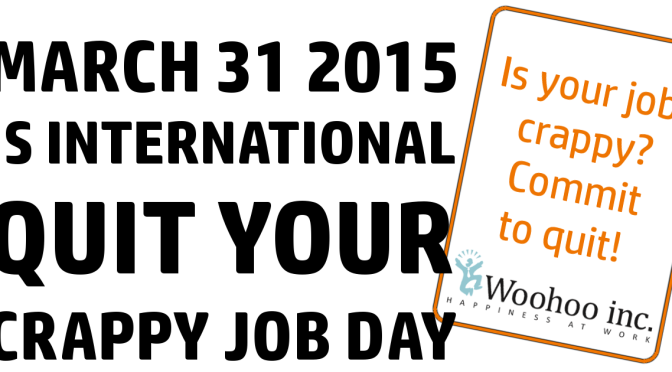We have JUST launched this year’s conference about happiness at work. This year we have 10 great speakers from 5 different countries who will share what they know abd do about happiness at work.
Category: Happy At Work
How to be happy at work
-
Thank you Iceland
I’m back from Reykjavik where I did a workshop for Icelandic pharmaceutical company Medis (part of Actavis) at their 30th anniversary and 2015 kick-off meeting.
Thank you to everyone at Medis for being tremendously kind and for being such generous hosts.
I loved Iceland! People are kind and funny, Reykjavik is beautiful and the food there is AMAZING. I’ll be back :)
This means we’ve now spoken in 34 countries. Awesome!
From the workshop The view from the meeting room Inside the building The new concert house in Reykjavik where I spoke -

Top 5 Myths About Quitting Your Job
I’ve been pretty unhappy in my job for quite a while now. The workplace is fairly stressed, I feel completely unappreciated and I can’t really see the purpose of most of the work I do.
I want to get out of there but whenever I discuss the idea of quitting with my friends and family, I get the same reactions: “Are you sure that’s the right thing to do? Surely your job can’t be that bad. Maybe things will get better.”
My parents were worried how I would provide for my family and basically called me selfish for not just sticking with it. One friend even warned me “quitting will look bad on your CV.”
Quitting a job you don’t like is a tough call and it’s made tougher by some very persistent myths. These myths create a social stigma around quitting – which is silly because quitting is perfectly natural. In fact, 10-15% of us do it every year.
These myths keep us stuck in bad jobs and give bad leaders and toxic workplaces much more power over us than they would otherwise have. Let’s change that. Here are the Top 5 Myths About Quitting.
Myth #5: Quitting = failure
- “Don’t be a quitter.”
- “No one likes a quitter.”
- “Winners never quit and quitters never win.”
Do any of these sound familiar? According to traditional thinking, once you’ve started something you should never quit and if you do it’s a clear sign of failure.
I say that’s completely wrong and sometimes quitting is exactly the right thing to do. I’m reminded of the story of Danish opera soprano Tina Kiberg.
As a child, Tina was a pretty good violinist and spent her free time practicing and practicing. One day she participated in a violin contest and realized that she would never be more than a mediocre violinist and that she also enjoyed singing more. She quit the violin, took up singing and became a leading international opera singer.
If she had seen quitting as always the wrong thing to do, she might have been stuck with the violin.
Also, try to guess what these somewhat successful people have in common: Larry Page, Sergey Brin, Tiger Woods, Reese Witherspoon, John McEnroe and John Steinbeck?
Yep, they all dropped out of Stanford.
Truth #5: Sometimes quitting is the way to success in something else and staying = failure.
Myth #4: Quitting is the easy way out
You quit your job? Well, I guess you don’t have what it takes to succeed. Too bad you couldn’t hack it and chose the easy way out.
Some people see quitting as a sign of weakness. I say that’s nonsense. In fact, the easy thing to do is to just keep mindlessly going into that job you hate day after day, year after year. It may be horrible, but you know what you have and you avoid the uncertainty of making big life-changing decisions.
Quitting on the other hand takes guts. In fact, quitting a workplace that is toxic or getting away from a boss who’s a complete jerk can be a downright heroic act.
Truth #4: Quitting can be a courageous (or even heroic) act.
Myth #3: Quitting is selfish
How can you be so selfish and quit your job? You’re letting down the workplace, your customers and your coworkers. Also, think of your family – how are they going to manage if you quit?
Wrong.
If you don’t like your job, you’re doing no one a favor by staying. When you’re unhappy at work, it tends to affect everyone around you through a phenomenon called emotional contagion and there’s a good chance you’re making your coworkers and possibly even customers less happy.
As for your family, maybe they would be happier if you didn’t come home from work every day tired and frustrated. You might even set an example for your kids. A member of the audience asked me this at one of my speeches last year:
If you go into work day after day, year after year, and really hate your job and come home stressed and angry – what are you teaching your kids?
Truth #3: Quitting is not inherently selfish.
Myth #2: Quitting is risky for your career
If you quit your job it’s going to look bad on your CV and your career will take a hit.
Yes – and staying for years in a job you hate and that is slowly wearing you down is going to be AWESOME for your career.
This myth completely ignores the career risks of staying in a job you hate. In fact, the longer you stay, the more you lose the energy, motivation and self-confidence you need to advance your career.
Truth #2: Sometimes quitting is the best thing you can do for your career.
Myth #1: Quitting is a last resort
Sure you can consider quitting, but you should exhaust all other options first. You only quit when everything else has failed.
For people who believe this myth, quitting is the very last option. It’s what you do once you’re too broken and exhausted to possibly stay on at your current job.
That makes this potentially the most dangerous of the myths listed here, because it means people stay in bad jobs until (or past) their breaking points.
Truth #1: Quit when it’s the right thing to do – not when it’s the only option left.
The upshot
Whenever a friend tells me they’ve quit their job my instant reaction is always “Awesome! You made a tough career decision. You took initiative and decided to move away from a bad job or into something even better.”
I say we start celebrating those who quit their jobs for the brave, motivated and proactive individuals they are.
Your take
Did I miss any myths about quitting? Have you encountered any of these in your work life? How do you react when someone close to you talks about possibly quitting their jobs?
Related
-
Happiness at work in Turkey

I spent three days in Istanbul this week launching our partnership with local company Power of Happiness who will be using some of our tools and concepts with clients in Turkey.
First I did a workshop for a group of leaders from Borusan (a big Turkish holding company) and on Tuesday we did an open speech for invited HR managers and executives from some big Turkish and international businesses.

Here I am with Tijen, Ferah and Diana – our new partners in Turkey. They are not only passionate about happiness at work, they also have enormous experience in coaching, speaking, facilitation, event planning, pr and leadership. And they’re also nice people and gracious hosts and made me feel very at home in Istanbul. We are incredibly excited about this partnership and the interest from clients in Turkey has been very encouraging.Next step is a big conference about happiness at work in Istanbul on March 25. Contact Power of Happiness if you’re interested in attending.
-
Happy Hour in Turkish

On Tuesday I signed the contract with Dögan Egmont, a Turkish publisher, to publish my first book Happy Hour is 9 to 5 in Turkish.
We’re looking for an accelerated launch and hoping to get it out in late March. Thank you to everyone at Dögan Egmont and thank you to our new friends and partners at Power of Happiness in Istanbul for making this happen.
-
One of our favorite business books now has a workbook
One of our absolute favorite books around Woohoo HQ is David Marquet’s “Turn the Ship Around” where he shares his story of taking command of a nuclear submarine and making it a happier and more democratic workplace.
He also told his story at our 2013 conference:
Now David has just released a workbook to help readers put the lessons from his book into practice. I just got mine and it is excellent.
If you want to make your employees happier, more engaged and more effective, get the workbook here.
-
Celebrate those who help others
I’ve previously mentioned New York-based company Next Jump and the great culture they’ve created. One of their practices that really inspires me is that their most important and prestigious employee award is not given based on performance but based on who helps others the most.
In the video above you can see their 2014 ceremony – it is both brilliant and moving.
-
Webinar + slides: Leading With Happiness
I just completed our latest webinar – this one is called Leading With Happiness – and the video is live and available right here:
It’s 30 minutes long. If you want my slides, get’em right here.
We believe that there is a new style of leadership emerging – one that focuses more on doing what’s good for employees and customers than on short-term profits. A form of leadership, in short, that has happiness at its core.
Topics:
- What does happy leadership look like? How do you do it in practice?
- How can managers themselves stay happy in their careers?
- What are great examples of happy leaders?
- Could it be that happy leaders ultimately create better results than traditional leaders?
I mentioned Southwest Airlines as a great example of a workplace that practices this. Here’s a video where their former President Colleen Barrett explains their thinking:
Our previous webinar was called “What REALLY makes us happy at work.” You can see it right here.
-
How to be a workplace rebel
My speech from this year’s Meaning Conference in Brighton just went live. It’s 11 minutes long and you can watch it right here:
I personally feel this speech was pretty rough – it is the very first time I’ve spoken about this particular topic and it shows. But I’m very passionate about inspiring more people to say “NO” at work and will be refining this message further.
The web site I mention in the speech is live and you can go on there now and get a ton of tips on quitting your job.
-

March 31 2015 is International Quit Your Crappy Job Day
Too many people stay for too long in jobs they hate. An estimated 20-25% of employees hate their jobs and wish they could quit tomorrow.
This is bad for you. Being unhappy at work can destroy your career, your health, your family and your private life.
Quitting is an option and often it’s the best option. That’s why we’re declaring March 31 to be International Quit Your Crappy Job Day.
We’ve created a web site for it, where you can test yourself to see if it’s time to quit and get knowledge and inspiration to actually do it.
Visit InternationalQuitYourCrappyJobDay.com.
Know someone who’s miserable at work? Share the site with them and maybe that can inspire them to move on to something better.






